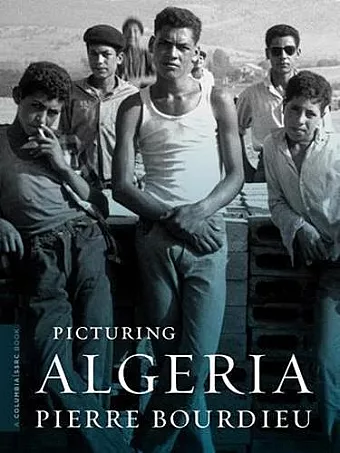Picturing Algeria
Pierre Bourdieu author Franz Schultheis editor Christine Frisinghelli editor
Format:Hardback
Publisher:Columbia University Press
Published:25th May '12
Currently unavailable, and unfortunately no date known when it will be back

As a soldier in the French army, Pierre Bourdieu took thousands of photographs documenting the abject conditions and suffering (as well as the resourcefulness, determination, grace, and dignity) of the Algerian people as they fought in the Algerian War (1954-1962). Sympathizing with those he was told to regard as "enemies," Bourdieu became deeply and permanently invested in their struggle to overthrow French rule and the debilitations of poverty. Bourdieu immediately undertook the creation of a new ethnographic-sociological science based on his experiences-one that was capable of explaining the mechanics of French colonial aggression and the impressive, if curious, ability of the Algerians to resist it. This volume pairs 130 of Bourdieu's photographs with key excerpts from his related writings. It also features an interview with Bourdieu in which he speaks to his experiences in Algeria, its significance on his intellectual evolution, his role in transforming photography into a means for social inquiry, and the duty of the committed intellectual to participate in an increasingly troubled world.
As a soldier in the French army, Pierre Bourdieu took thousands of photographs documenting the abject conditions and suffering (as well as the resourcefulness, determination, grace, and dignity) of the Algerian people as they fought in the Algerian War (1954-1962). Sympathizing with those he was told to regard as "enemies," Bourdieu became deeply and permanently invested in their struggle to overthrow French rule and the debilitations of poverty. Upon realizing the inability of his education to make sense of this wartime reality, Bourdieu immediately undertook the creation of a new ethnographic-sociological science based on his experiences-one that became synonymous with his work over the next few decades and was capable of explaining the mechanics of French colonial aggression and the impressive, if curious, ability of the Algerians to resist it. This volume pairs 130 of Bourdieu's photographs with key excerpts from his related writings, very few of which have been translated into English. Many of these images, luminous aesthetic objects in their own right, comment eloquently on the accompanying words even as they are commented upon by them. Bourdieu's work set the standard for all subsequent ethnographic photography and critique. This volume also features a 2001 interview with Bourdieu, in which he speaks to his experiences in Algeria, its significance on his intellectual evolution, his role in transforming photography into a means for social inquiry, and the duty of the committed intellectual to participate in an increasingly troubled world.
A seminal work that is strongly recommended reading. The Midwest Book Review Essential reading for those who are interested in the link between colonial politics and ethnographic practices. -- Muriam Haleh Davis Arab Studies Journal With its translation of lesser-known texts, thoughtful juxtaposition of texts and images, and, above all, beautiful presentation of the photographs, this book provides a fascinating glimps into the working process and intellectual origins of the most important scholars of the twentieth century. H-France Review Picturing Algeria juxtaposes Bourdieu's photographs with excerpts from his later writings, enabling the reader/viewer to grasp the destruction left in the wake of colonial violence. -- Olivia Harrison The Los Angeles Review of Books Picturing Algeria is worth its price for the 130 images alone... An invaluable contribution to scholarship. The photographs offer a rare glimpse into an unfamiliar aspect of Bourdieu's work in Algeria, displaying the literal lenses through which he framed his research sites. Journal of Historical Geography
ISBN: 9780231148429
Dimensions: unknown
Weight: unknown
248 pages